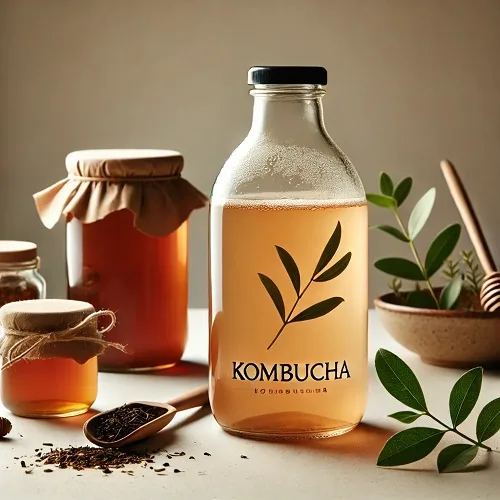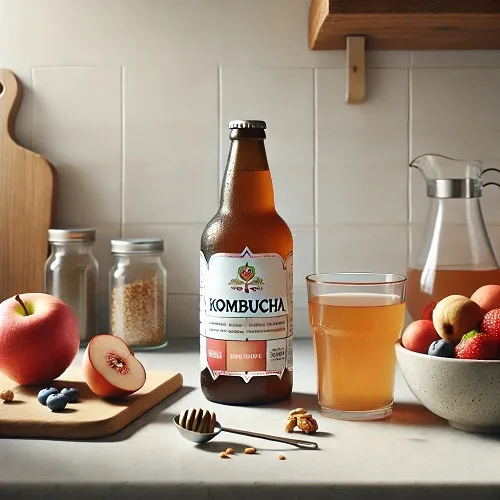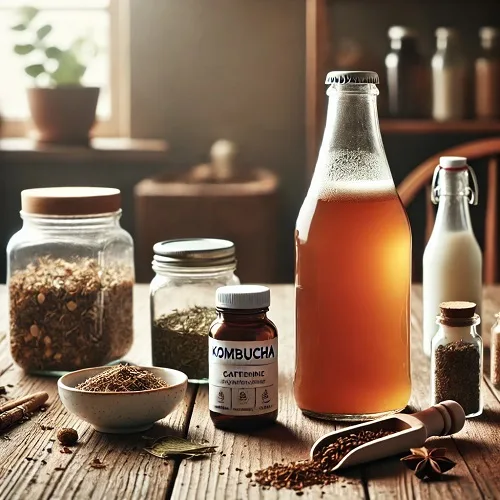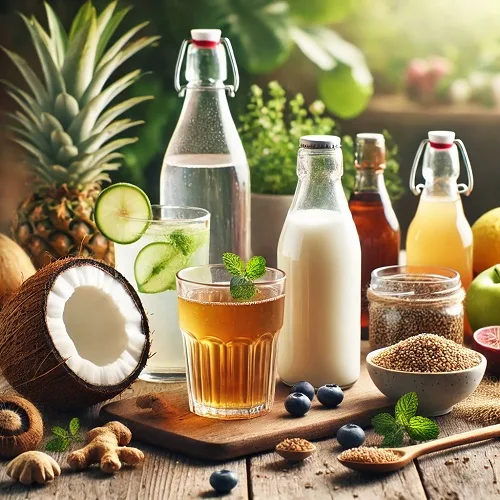1. Introduction: Understanding the Safety of Kombucha During Breastfeeding
As a new mom, your top priority is always the well-being of your baby. Naturally, this includes being cautious about what you eat and drink, especially when it comes to something as trendy as kombucha. The question many mothers find themselves asking is, “Is it safe to drink kombucha while breastfeeding?” With its rising popularity as a probiotic drink, kombucha promises health benefits like improved digestion and enhanced immunity. But when it comes to nursing, the stakes are higher. Could this fizzy, fermented beverage pose any risks to your baby’s health?
In this article, we’ll dive into the fact is it safe to drink kombucha while breastfeeding and kombucha health benefits that have made it a go-to drink for many, and we’ll examine the concerns surrounding its consumption during breastfeeding and kombucha use. While kombucha pregnancy guidelines are clear, there’s often less clarity when it comes to nursing mothers. So, is it safe for new moms to enjoy a glass of kombucha, or should it be avoided? Let’s dive deeper to assist you in making a well-informed choice.
Table of Contents
2. What is Kombucha? A Brief Overview of the Drink

Is it safe to drink kombucha while breastfeeding? Kombucha is a fermented tea that has been consumed for centuries due to its potential health benefits. The drink is produced by fermenting tea sweetened with sugar and a SCOBY (symbiotic culture of bacteria and yeast). This process leads to the creation of kombucha microbes, which are responsible for its rich probiotic content. Over time, kombucha has gained popularity as one of the most widely consumed probiotic beverages due to its ability to support digestion and promote overall health.
The fermentation process not only gives kombucha its signature tangy flavor but also produces a variety of bioactive compounds. These include organic acids, B vitamins, and a rich array of beneficial microbes that contribute to gut health. These kombucha health benefits have made it a staple for those seeking to balance their digestive system and improve their immune function. For many, it’s a refreshing, natural alternative to sugary sodas, offering both a tasty and functional drink.
In addition to promoting gut health, kombucha is also believed to help detoxify the body, support liver function, and even boost energy. The kombucha ingredients, such as green or black tea, sugar, and the active cultures, come together to create a beverage that’s both beneficial and enjoyable. Whether you drink it for its health benefits or simply for its unique taste, kombucha has firmly established itself as a favorite among wellness enthusiasts.
3. The Nutritional Benefits of Kombucha

Kombucha is more than just a flavorful, fizzy drink — it’s packed with a range of kombucha benefits for health that make it a popular choice for many. One of the most notable aspects of kombucha is its rich probiotic content. The fermentation process produces beneficial bacteria, or probiotics in kombucha, which help support a healthy gut. Regularly consuming kombucha can contribute to improved digestion, as it helps restore balance to the gut microbiota, reducing bloating and discomfort.
In addition to probiotics, kombucha is also a source of antioxidants, which play a key role in fighting oxidative stress and promoting overall health. These antioxidants, derived from the tea used in fermentation, can help protect the body from damage caused by free radicals, reducing the risk of chronic diseases. The kombucha nutrition facts reveal that this drink is also a good source of B vitamins, which support energy production and mental clarity. This is particularly beneficial for breastfeeding mothers, who often need an energy boost to help them navigate the demands of new motherhood.
Furthermore, kombucha can help strengthen the immune system. The kombucha benefits for digestion are well-known, but the drink’s antimicrobial properties also help defend the body against infections. For new moms who want to support their immune function while staying hydrated, kombucha can be a wonderful addition to their daily routine.
While kombucha is a great option for many, it’s important to enjoy it in moderation, especially when breastfeeding. Too much caffeine or sugar may not be ideal for nursing mothers, so keeping track of intake is essential to reap the kombucha energy boost without overdoing it. When consumed responsibly, kombucha can offer a delicious and healthful addition to a breastfeeding diet.
4. Potential Risks of Drinking Kombucha While Breastfeeding
While kombucha offers several health benefits, there are certain kombucha side effects that breastfeeding mothers should be aware of before adding it to their daily routine. It’s important to approach kombucha with caution, as it contains elements that may affect both the mother and the baby.
One of the most significant concerns is kombucha alcohol content. During the fermentation process, kombucha naturally produces small amounts of alcohol. While the alcohol content in most commercial kombucha is generally low (usually less than 0.5%), it may still pose a risk to nursing mothers if consumed in large quantities. Alcohol, even in small amounts, can be transferred to breast milk and may affect your baby’s development, sleep patterns, and overall health. It’s essential to check the label of your kombucha brand and choose options labeled as alcohol-free if you plan to consume it while breastfeeding.
Another potential concern is the kombucha caffeine content. Since kombucha is made from tea, it retains the caffeine levels from the type of tea used (typically black or green tea). While the caffeine content in kombucha is generally lower than in a cup of coffee, it may still be a factor to consider, especially for mothers who are sensitive to caffeine. Excessive caffeine intake can lead to irritability or disrupted sleep patterns for both mothers and babies. If you’re breastfeeding, it’s wise to monitor your total caffeine intake from all sources to avoid overstimulation.
Beyond these ingredients, there are also broader kombucha safety concerns regarding its impact on milk production. The high levels of probiotics found in kombucha could potentially alter gut flora in both the mother and the baby. While probiotics generally support digestive health, they may cause temporary digestive disturbances in some individuals. If you experience bloating, gas, or upset stomach after drinking kombucha, it may be wise to reduce your intake or eliminate it entirely.
Finally, some people may be sensitive to the acidity of kombucha, which can cause heartburn or irritation in sensitive individuals. Kombucha and breastfeeding should be approached with care, as the mother’s comfort is crucial for both her and her baby’s health. If you’re uncertain about any of these potential risks, consulting with a healthcare provider or lactation consultant is always a good idea to ensure kombucha is safe for your specific situation.
By keeping these kombucha dangers in mind, you can make an informed decision about whether or not kombucha fits into your breastfeeding routine. Moderation is key when it comes to kombucha, as consuming it in moderation allows you to enjoy the benefits while minimizing the risks.
ALSO READ
Can You Take Pre-Workout While Breastfeeding Safely
Castor Oil for Endometriosis: Proven Benefits & Uses
Menstrual Cramps After Menopause: Effective Solutions
5. Expert Opinions on Kombucha and Breastfeeding

When it comes to kombucha and breastfeeding, expert opinions vary, but many professionals agree that moderation and mindfulness are key. Breastfeeding experts, including lactation consultant advice, often recommend that new mothers carefully consider the potential effects of kombucha on their body and baby. Although kombucha can be a healthy choice for some, it’s important to remember that each individual’s body and breastfeeding experience are unique.
Many kombucha and breastfeeding experts stress the importance of moderation. Dr. Sarah Johnson, a pediatrician with years of experience working with nursing mothers, suggests that kombucha can generally be safe in small quantities, especially if it is consumed in place of sugary sodas or other processed drinks. However, she points out that its caffeine and alcohol content could be concerning for some infants, especially those who are particularly sensitive. She recommends limiting kombucha to one small serving per day, particularly for mothers with infants who are under six months old.
Additionally, medical advice on kombucha often encourages breastfeeding mothers to pay attention to their baby’s reactions. If an infant shows signs of irritability or disrupted sleep patterns, it may be worthwhile to reduce or eliminate kombucha consumption, as both caffeine and alcohol can potentially pass into breast milk and affect the baby.
It is always best to consult with your healthcare provider before introducing kombucha into your diet while breastfeeding. This will help ensure that you make a choice that supports both your health and your baby’s wellbeing. By listening to expert advice, you can confidently navigate your breastfeeding journey with the knowledge that you’re making informed decisions about your diet.
6. How to Safely Incorporate Kombucha Into Your Diet While Breastfeeding

If you’ve decided to enjoy kombucha while breastfeeding, it’s essential to approach it with caution and awareness. Here are some kombucha consumption tips to help you safely incorporate it into your breastfeeding diet.
I. Mind Your Serving Size:
Moderation is key when it comes to drinking kombucha while breastfeeding. While it offers numerous kombucha health benefits, it’s best not to overconsume it. A general recommendation is to start with a small serving—typically no more than 4-6 ounces per day. This allows you to enjoy the refreshing drink without overloading on caffeine or sugar. The kombucha serving size should be adjusted based on your personal tolerance and your baby’s reaction.
II. Opt for Low-Alcohol or Alcohol-Free Kombucha:
One of the concerns when consuming kombucha while breastfeeding is its alcohol content. During the fermentation process, small amounts of alcohol are produced. While most commercial kombuchas have less than 0.5% alcohol by volume (ABV), it’s still important to select a brand labeled as alcohol-free or low-alcohol, especially if you’re breastfeeding. Alcohol can pass into your breast milk and may affect your baby’s sleep or behavior. Always check labels to ensure the kombucha you choose is safe for you and your baby.
III. Choose the Right Brand:
When purchasing kombucha, look for a reputable brand that uses high-quality ingredients and follows strict production standards. Many commercial kombucha drinks contain added sugars or artificial flavorings that you may want to avoid while breastfeeding. Opt for kombucha moderation by selecting a drink that is as natural and organic as possible. Be cautious about the caffeine content, too—some kombucha varieties contain higher levels of caffeine, so you may want to stick to those with lower amounts.
IV. Monitor Your Baby’s Response:
Every baby is different, and some infants may be sensitive to certain compounds found in kombucha, such as caffeine or probiotics. If you notice any changes in your baby’s behavior—such as irritability, fussiness, or trouble sleeping—consider adjusting your kombucha intake. Kombucha and baby health are closely linked, and paying attention to your child’s reactions can guide your decisions.
By following these practical tips and consuming kombucha responsibly, you can enjoy this healthy, probiotic-rich beverage while prioritizing your baby’s safety and wellbeing. As always, if you have any concerns, consult your healthcare provider or lactation consultant before making any significant changes to your diet.
7. Common Myths and Misconceptions About Kombucha and Breastfeeding

There are several kombucha myths circulating, particularly regarding its safety during breastfeeding. Let’s address some of the most common kombucha breastfeeding myths and misconceptions to clear up any confusion.
Myth #1: Kombucha Causes Low Milk Supply
One widespread concern is that kombucha can cause a decrease in milk production. Nonetheless, there is no scientific proof backing this assertion. In fact, kombucha is a source of probiotics, which can promote overall digestive health, and there is no direct link between kombucha consumption and reduced milk supply. While it’s important to stay hydrated and maintain a balanced diet for optimal milk production, kombucha does not inherently affect milk levels negatively when consumed in moderation.
Myth #2: Kombucha Is Unsafe for Breastfeeding Mothers
Another common kombucha misconception is that kombucha is completely unsafe for breastfeeding mothers. While it’s true that kombucha contains caffeine and alcohol from the fermentation process, the amounts are generally low. Most kombucha safety concerns are related to overconsumption. When enjoyed in moderation—especially by choosing low-alcohol and low-caffeine options—kombucha can be a safe and healthy addition to a breastfeeding mother’s diet.
Myth #3: Kombucha Will Harm Your Baby
Some mothers worry that drinking kombucha will have negative effects on their baby’s health. However, there is no evidence that kombucha has any harmful effects on babies when consumed in moderation. As with any new food or drink during breastfeeding, it’s best to monitor your baby’s response. If you notice any unusual behavior, consult with a healthcare provider, but for the most part, kombucha poses no risk to infant health.
By addressing these common myths, we can reassure mothers that kombucha, when consumed responsibly, can be a safe and beneficial addition to their breastfeeding routine.
8. Alternatives to Kombucha While Breastfeeding

If you’re looking for safe drinks for nursing mothers but prefer to skip kombucha, there are plenty of caffeine-free drinks and alternatives that can support your health and hydration during breastfeeding.
Herbal Teas:
One of the best healthy beverages for breastfeeding moms is herbal tea. Options like chamomile, peppermint, or ginger tea are caffeine-free and can help with digestion and relaxation. These teas are gentle on the stomach and promote hydration, without the concerns that come with kombucha’s caffeine or alcohol content.
Coconut Water:
Coconut water is another excellent alternative, known for its natural electrolytes and hydration properties. It’s a refreshing, low-calorie drink that can help replenish fluids, making it a great option for breastfeeding mothers who need to stay hydrated throughout the day.
Kefir:
If you’re looking for another alternative probiotic drink, kefir might be a good choice. Like kombucha, kefir is rich in probiotics but tends to be milder on the stomach. It comes in both dairy and non-dairy varieties, offering a versatile and safe way to support your gut health while breastfeeding.
By choosing these alternatives, you can maintain a healthy and well-hydrated body without compromising your baby’s safety, ensuring you get all the benefits without the risks associated with kombucha.
9. Conclusion: Is Kombucha Safe to Drink While Breastfeeding?
In conclusion, is it safe to drink kombucha while breastfeeding? Kombucha can be a safe drink for breastfeeding mothers when consumed in moderation. It offers many health benefits, including promoting gut health and providing probiotics, but it also comes with certain considerations such as caffeine and alcohol content. It’s important to be mindful of safe drinking habits and pay attention to how your body and your baby respond to kombucha.
When it comes to breastfeeding safety, moderation is key. If you choose to include kombucha in your diet, stick to small servings and opt for low-alcohol, low-caffeine varieties. Always monitor your baby’s reaction and adjust accordingly. If in doubt, consulting a healthcare professional or lactation consultant can provide personalized guidance, ensuring that you make the best decision for both you and your baby’s health.
10. Frequently Asked Questions (FAQ)
Can I drink kombucha every day while breastfeeding?
While kombucha can be enjoyed in moderation, it’s best not to drink it every day. Due to its caffeine and alcohol content, consuming kombucha daily may not be ideal for all breastfeeding mothers. Moderation is key to ensuring your health and your baby’s safety.
How much kombucha is safe for breastfeeding mothers?
It’s generally recommended to limit kombucha intake to 4-6 ounces per day while breastfeeding. This allows you to enjoy its benefits without overconsumption of caffeine or alcohol. Always pay attention to how your body and baby react to kombucha.
Can kombucha affect my baby’s health while breastfeeding?
In most cases, kombucha does not negatively affect babies when consumed in moderation. However, due to its caffeine and alcohol content, it’s important to monitor your baby’s behavior and sleep patterns. If any unusual reactions occur, reduce or stop kombucha consumption.
What are some safe drinks during breastfeeding?
If you’re looking for alternatives, there are many safe drinks during breastfeeding like herbal teas (chamomile, peppermint), coconut water for hydration, and kefir, which also offers probiotics without the concerns associated with kombucha.






